Individual Assignment: Taxation Law of Australia, Term 2, 2019
VerifiedAdded on 2022/12/29
|13
|3339
|59
Homework Assignment
AI Summary
This assignment solution addresses key aspects of Australian taxation law. It begins by analyzing the Commissioner's view on when a company can carry on a business and covers topics such as gift deductibility, top tax rates, capital gains tax (CGT), and the taxation of income. The solution also explores the differences between ordinary and statutory income, Medicare levy and Medicare levy surcharge, and residency requirements. The assignment then delves into specific deduction claims, evaluating the deductibility of various expenses, including HECS-HELP payments, work-related travel, book purchases, child care, and clothing. It concludes with a discussion of CGT events related to land leasing and capital gains.
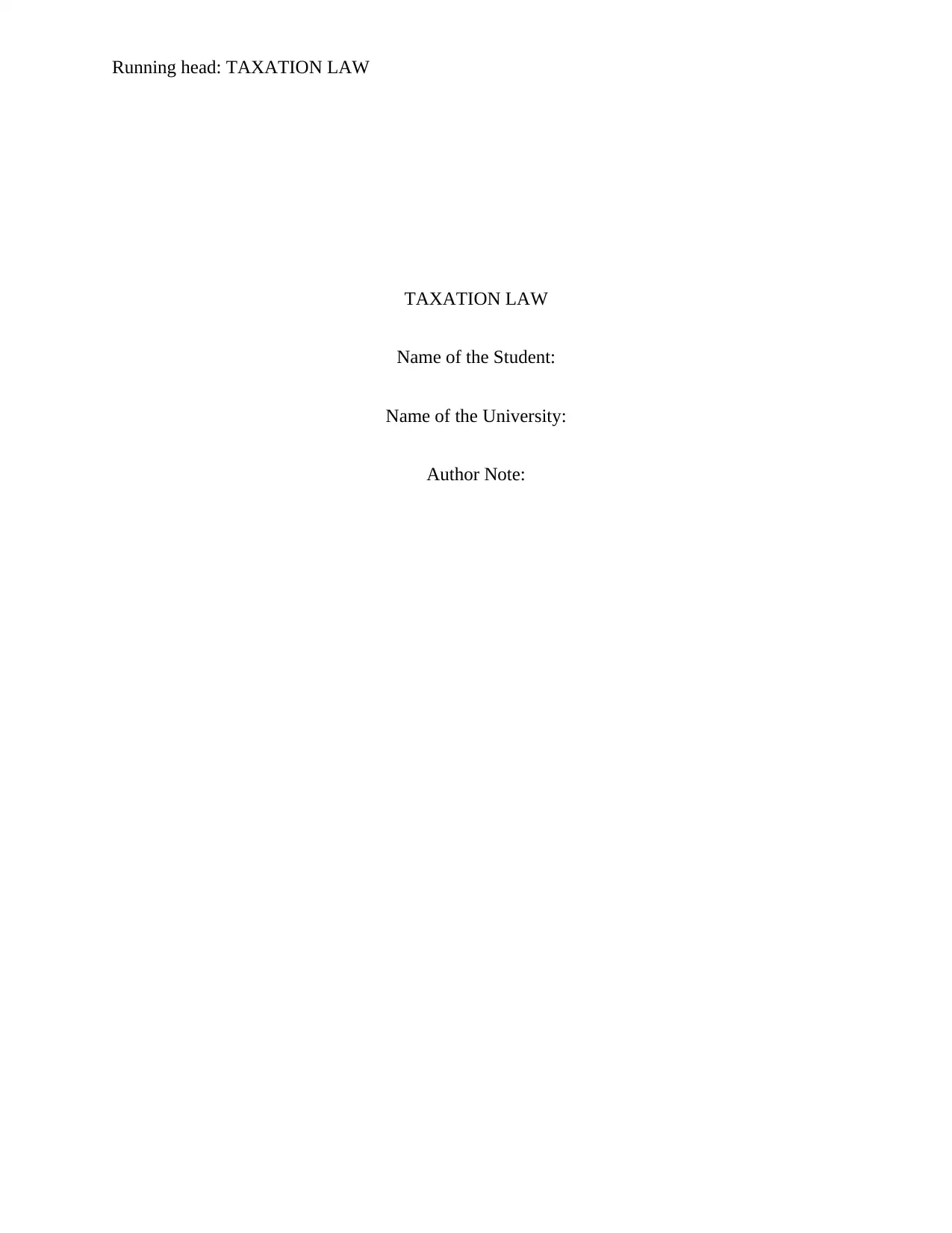
Running head: TAXATION LAW
TAXATION LAW
Name of the Student:
Name of the University:
Author Note:
TAXATION LAW
Name of the Student:
Name of the University:
Author Note:
Paraphrase This Document
Need a fresh take? Get an instant paraphrase of this document with our AI Paraphraser
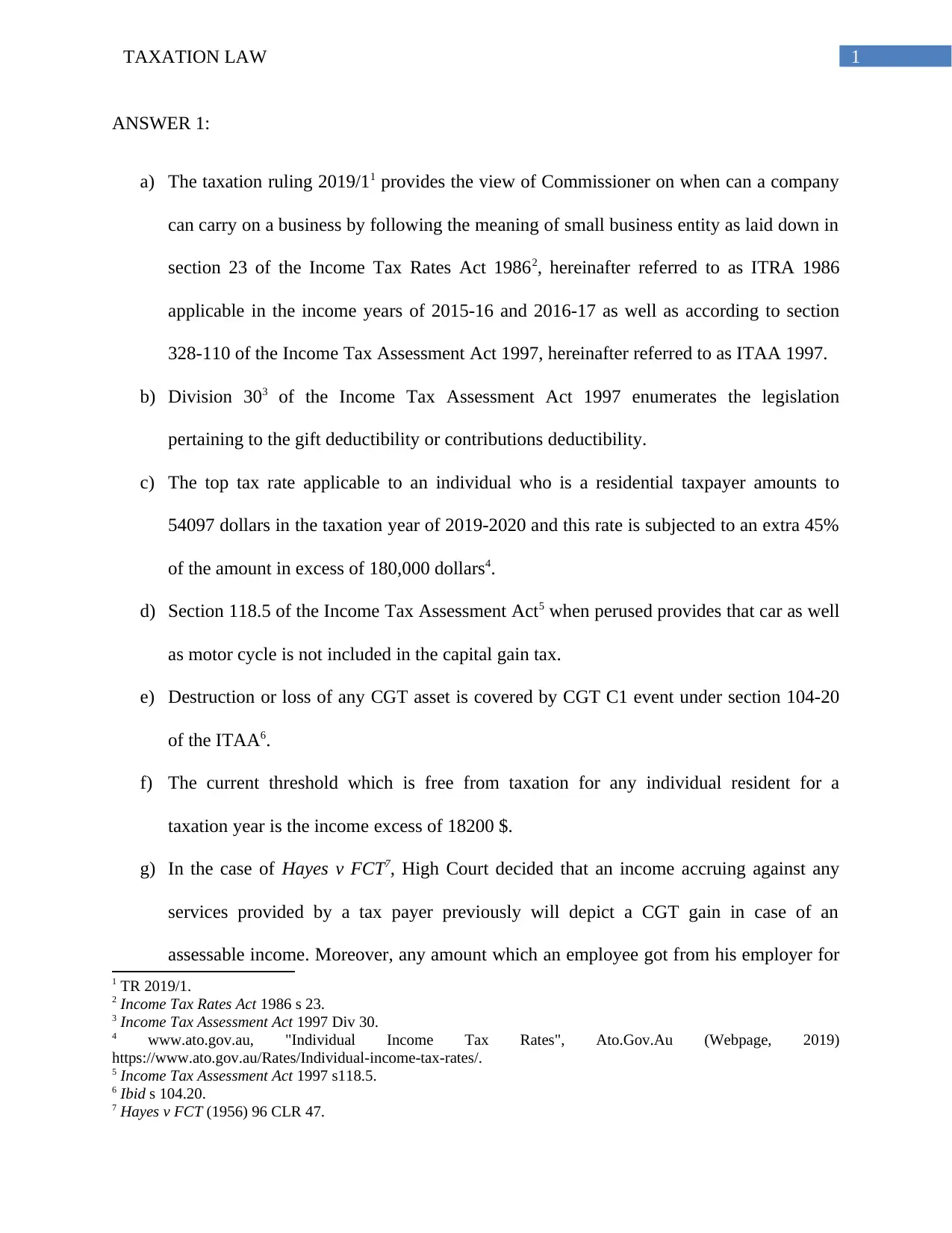
1TAXATION LAW
ANSWER 1:
a) The taxation ruling 2019/11 provides the view of Commissioner on when can a company
can carry on a business by following the meaning of small business entity as laid down in
section 23 of the Income Tax Rates Act 19862, hereinafter referred to as ITRA 1986
applicable in the income years of 2015-16 and 2016-17 as well as according to section
328-110 of the Income Tax Assessment Act 1997, hereinafter referred to as ITAA 1997.
b) Division 303 of the Income Tax Assessment Act 1997 enumerates the legislation
pertaining to the gift deductibility or contributions deductibility.
c) The top tax rate applicable to an individual who is a residential taxpayer amounts to
54097 dollars in the taxation year of 2019-2020 and this rate is subjected to an extra 45%
of the amount in excess of 180,000 dollars4.
d) Section 118.5 of the Income Tax Assessment Act5 when perused provides that car as well
as motor cycle is not included in the capital gain tax.
e) Destruction or loss of any CGT asset is covered by CGT C1 event under section 104-20
of the ITAA6.
f) The current threshold which is free from taxation for any individual resident for a
taxation year is the income excess of 18200 $.
g) In the case of Hayes v FCT7, High Court decided that an income accruing against any
services provided by a tax payer previously will depict a CGT gain in case of an
assessable income. Moreover, any amount which an employee got from his employer for
1 TR 2019/1.
2 Income Tax Rates Act 1986 s 23.
3 Income Tax Assessment Act 1997 Div 30.
4 www.ato.gov.au, "Individual Income Tax Rates", Ato.Gov.Au (Webpage, 2019)
https://www.ato.gov.au/Rates/Individual-income-tax-rates/.
5 Income Tax Assessment Act 1997 s118.5.
6 Ibid s 104.20.
7 Hayes v FCT (1956) 96 CLR 47.
ANSWER 1:
a) The taxation ruling 2019/11 provides the view of Commissioner on when can a company
can carry on a business by following the meaning of small business entity as laid down in
section 23 of the Income Tax Rates Act 19862, hereinafter referred to as ITRA 1986
applicable in the income years of 2015-16 and 2016-17 as well as according to section
328-110 of the Income Tax Assessment Act 1997, hereinafter referred to as ITAA 1997.
b) Division 303 of the Income Tax Assessment Act 1997 enumerates the legislation
pertaining to the gift deductibility or contributions deductibility.
c) The top tax rate applicable to an individual who is a residential taxpayer amounts to
54097 dollars in the taxation year of 2019-2020 and this rate is subjected to an extra 45%
of the amount in excess of 180,000 dollars4.
d) Section 118.5 of the Income Tax Assessment Act5 when perused provides that car as well
as motor cycle is not included in the capital gain tax.
e) Destruction or loss of any CGT asset is covered by CGT C1 event under section 104-20
of the ITAA6.
f) The current threshold which is free from taxation for any individual resident for a
taxation year is the income excess of 18200 $.
g) In the case of Hayes v FCT7, High Court decided that an income accruing against any
services provided by a tax payer previously will depict a CGT gain in case of an
assessable income. Moreover, any amount which an employee got from his employer for
1 TR 2019/1.
2 Income Tax Rates Act 1986 s 23.
3 Income Tax Assessment Act 1997 Div 30.
4 www.ato.gov.au, "Individual Income Tax Rates", Ato.Gov.Au (Webpage, 2019)
https://www.ato.gov.au/Rates/Individual-income-tax-rates/.
5 Income Tax Assessment Act 1997 s118.5.
6 Ibid s 104.20.
7 Hayes v FCT (1956) 96 CLR 47.
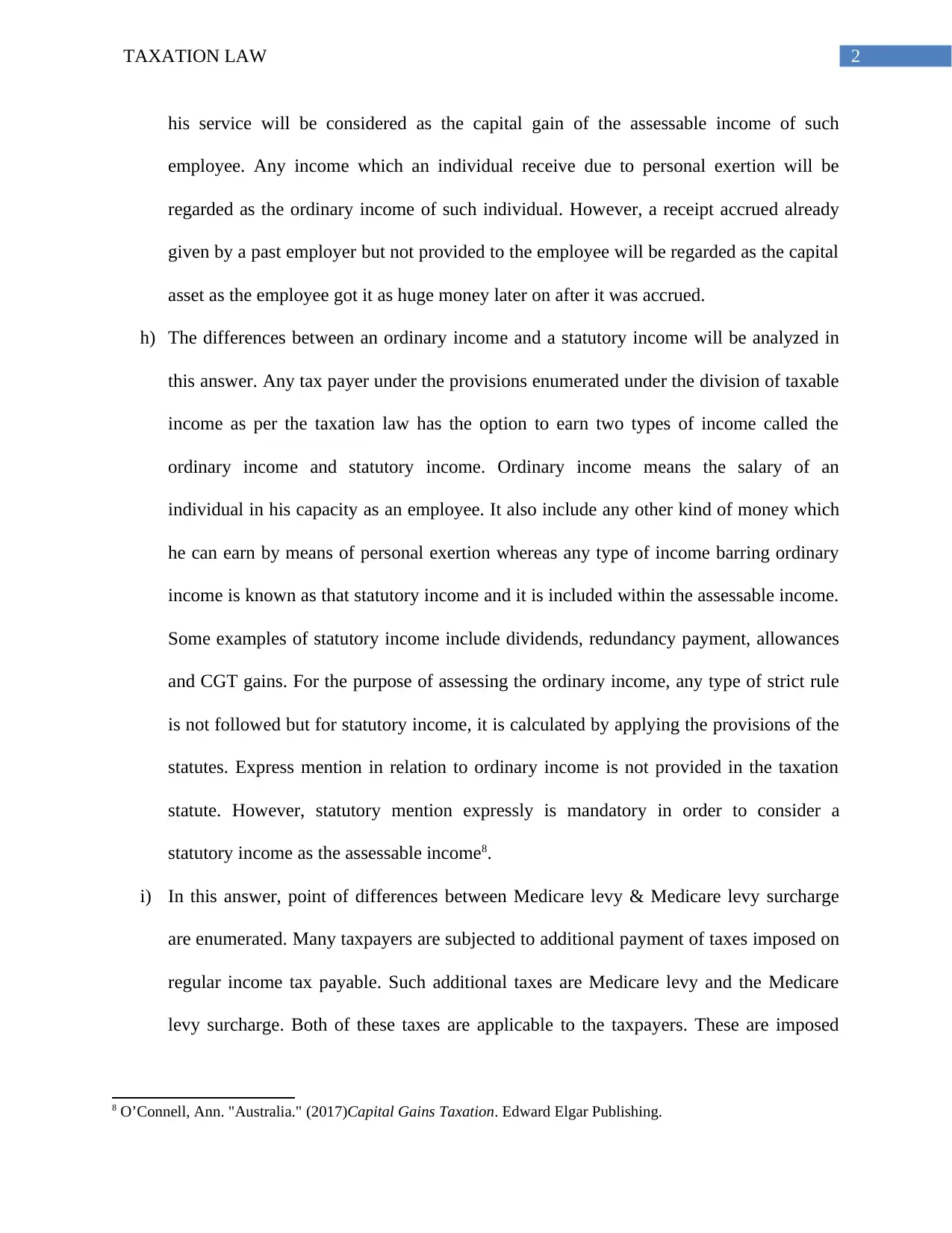
2TAXATION LAW
his service will be considered as the capital gain of the assessable income of such
employee. Any income which an individual receive due to personal exertion will be
regarded as the ordinary income of such individual. However, a receipt accrued already
given by a past employer but not provided to the employee will be regarded as the capital
asset as the employee got it as huge money later on after it was accrued.
h) The differences between an ordinary income and a statutory income will be analyzed in
this answer. Any tax payer under the provisions enumerated under the division of taxable
income as per the taxation law has the option to earn two types of income called the
ordinary income and statutory income. Ordinary income means the salary of an
individual in his capacity as an employee. It also include any other kind of money which
he can earn by means of personal exertion whereas any type of income barring ordinary
income is known as that statutory income and it is included within the assessable income.
Some examples of statutory income include dividends, redundancy payment, allowances
and CGT gains. For the purpose of assessing the ordinary income, any type of strict rule
is not followed but for statutory income, it is calculated by applying the provisions of the
statutes. Express mention in relation to ordinary income is not provided in the taxation
statute. However, statutory mention expressly is mandatory in order to consider a
statutory income as the assessable income8.
i) In this answer, point of differences between Medicare levy & Medicare levy surcharge
are enumerated. Many taxpayers are subjected to additional payment of taxes imposed on
regular income tax payable. Such additional taxes are Medicare levy and the Medicare
levy surcharge. Both of these taxes are applicable to the taxpayers. These are imposed
8 O’Connell, Ann. "Australia." (2017)Capital Gains Taxation. Edward Elgar Publishing.
his service will be considered as the capital gain of the assessable income of such
employee. Any income which an individual receive due to personal exertion will be
regarded as the ordinary income of such individual. However, a receipt accrued already
given by a past employer but not provided to the employee will be regarded as the capital
asset as the employee got it as huge money later on after it was accrued.
h) The differences between an ordinary income and a statutory income will be analyzed in
this answer. Any tax payer under the provisions enumerated under the division of taxable
income as per the taxation law has the option to earn two types of income called the
ordinary income and statutory income. Ordinary income means the salary of an
individual in his capacity as an employee. It also include any other kind of money which
he can earn by means of personal exertion whereas any type of income barring ordinary
income is known as that statutory income and it is included within the assessable income.
Some examples of statutory income include dividends, redundancy payment, allowances
and CGT gains. For the purpose of assessing the ordinary income, any type of strict rule
is not followed but for statutory income, it is calculated by applying the provisions of the
statutes. Express mention in relation to ordinary income is not provided in the taxation
statute. However, statutory mention expressly is mandatory in order to consider a
statutory income as the assessable income8.
i) In this answer, point of differences between Medicare levy & Medicare levy surcharge
are enumerated. Many taxpayers are subjected to additional payment of taxes imposed on
regular income tax payable. Such additional taxes are Medicare levy and the Medicare
levy surcharge. Both of these taxes are applicable to the taxpayers. These are imposed
8 O’Connell, Ann. "Australia." (2017)Capital Gains Taxation. Edward Elgar Publishing.
⊘ This is a preview!⊘
Do you want full access?
Subscribe today to unlock all pages.

Trusted by 1+ million students worldwide
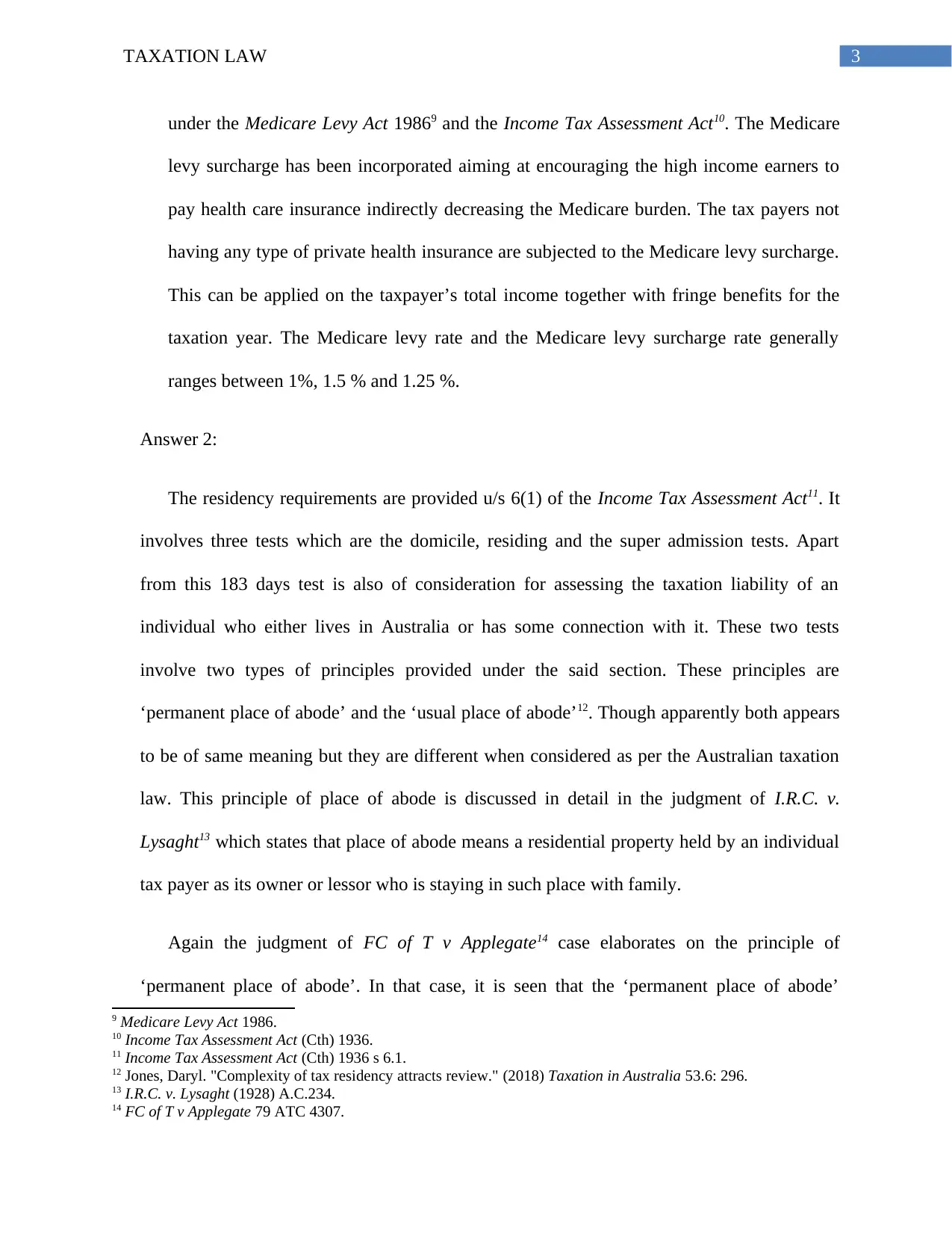
3TAXATION LAW
under the Medicare Levy Act 19869 and the Income Tax Assessment Act10. The Medicare
levy surcharge has been incorporated aiming at encouraging the high income earners to
pay health care insurance indirectly decreasing the Medicare burden. The tax payers not
having any type of private health insurance are subjected to the Medicare levy surcharge.
This can be applied on the taxpayer’s total income together with fringe benefits for the
taxation year. The Medicare levy rate and the Medicare levy surcharge rate generally
ranges between 1%, 1.5 % and 1.25 %.
Answer 2:
The residency requirements are provided u/s 6(1) of the Income Tax Assessment Act11. It
involves three tests which are the domicile, residing and the super admission tests. Apart
from this 183 days test is also of consideration for assessing the taxation liability of an
individual who either lives in Australia or has some connection with it. These two tests
involve two types of principles provided under the said section. These principles are
‘permanent place of abode’ and the ‘usual place of abode’12. Though apparently both appears
to be of same meaning but they are different when considered as per the Australian taxation
law. This principle of place of abode is discussed in detail in the judgment of I.R.C. v.
Lysaght13 which states that place of abode means a residential property held by an individual
tax payer as its owner or lessor who is staying in such place with family.
Again the judgment of FC of T v Applegate14 case elaborates on the principle of
‘permanent place of abode’. In that case, it is seen that the ‘permanent place of abode’
9 Medicare Levy Act 1986.
10 Income Tax Assessment Act (Cth) 1936.
11 Income Tax Assessment Act (Cth) 1936 s 6.1.
12 Jones, Daryl. "Complexity of tax residency attracts review." (2018) Taxation in Australia 53.6: 296.
13 I.R.C. v. Lysaght (1928) A.C.234.
14 FC of T v Applegate 79 ATC 4307.
under the Medicare Levy Act 19869 and the Income Tax Assessment Act10. The Medicare
levy surcharge has been incorporated aiming at encouraging the high income earners to
pay health care insurance indirectly decreasing the Medicare burden. The tax payers not
having any type of private health insurance are subjected to the Medicare levy surcharge.
This can be applied on the taxpayer’s total income together with fringe benefits for the
taxation year. The Medicare levy rate and the Medicare levy surcharge rate generally
ranges between 1%, 1.5 % and 1.25 %.
Answer 2:
The residency requirements are provided u/s 6(1) of the Income Tax Assessment Act11. It
involves three tests which are the domicile, residing and the super admission tests. Apart
from this 183 days test is also of consideration for assessing the taxation liability of an
individual who either lives in Australia or has some connection with it. These two tests
involve two types of principles provided under the said section. These principles are
‘permanent place of abode’ and the ‘usual place of abode’12. Though apparently both appears
to be of same meaning but they are different when considered as per the Australian taxation
law. This principle of place of abode is discussed in detail in the judgment of I.R.C. v.
Lysaght13 which states that place of abode means a residential property held by an individual
tax payer as its owner or lessor who is staying in such place with family.
Again the judgment of FC of T v Applegate14 case elaborates on the principle of
‘permanent place of abode’. In that case, it is seen that the ‘permanent place of abode’
9 Medicare Levy Act 1986.
10 Income Tax Assessment Act (Cth) 1936.
11 Income Tax Assessment Act (Cth) 1936 s 6.1.
12 Jones, Daryl. "Complexity of tax residency attracts review." (2018) Taxation in Australia 53.6: 296.
13 I.R.C. v. Lysaght (1928) A.C.234.
14 FC of T v Applegate 79 ATC 4307.
Paraphrase This Document
Need a fresh take? Get an instant paraphrase of this document with our AI Paraphraser
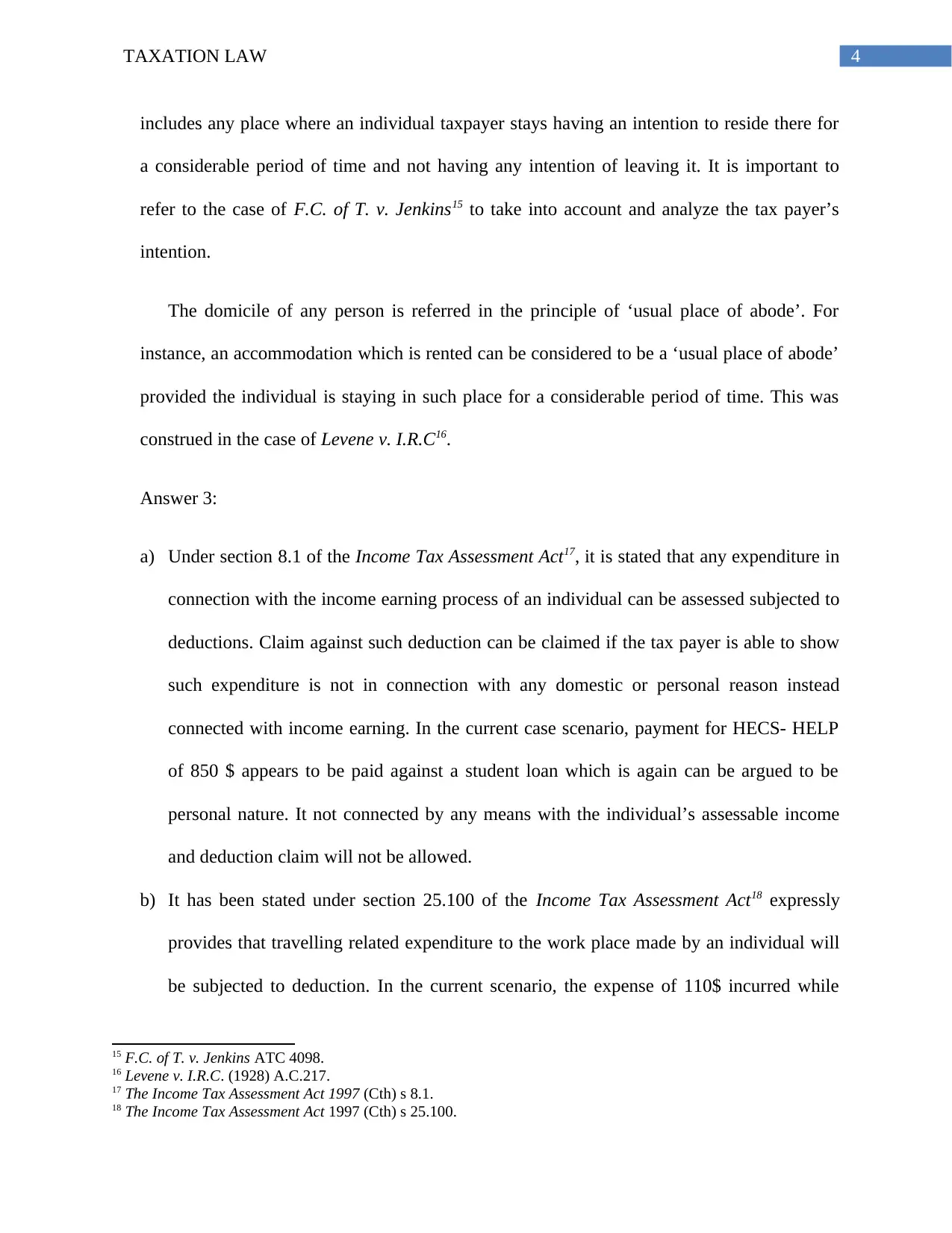
4TAXATION LAW
includes any place where an individual taxpayer stays having an intention to reside there for
a considerable period of time and not having any intention of leaving it. It is important to
refer to the case of F.C. of T. v. Jenkins15 to take into account and analyze the tax payer’s
intention.
The domicile of any person is referred in the principle of ‘usual place of abode’. For
instance, an accommodation which is rented can be considered to be a ‘usual place of abode’
provided the individual is staying in such place for a considerable period of time. This was
construed in the case of Levene v. I.R.C16.
Answer 3:
a) Under section 8.1 of the Income Tax Assessment Act17, it is stated that any expenditure in
connection with the income earning process of an individual can be assessed subjected to
deductions. Claim against such deduction can be claimed if the tax payer is able to show
such expenditure is not in connection with any domestic or personal reason instead
connected with income earning. In the current case scenario, payment for HECS- HELP
of 850 $ appears to be paid against a student loan which is again can be argued to be
personal nature. It not connected by any means with the individual’s assessable income
and deduction claim will not be allowed.
b) It has been stated under section 25.100 of the Income Tax Assessment Act18 expressly
provides that travelling related expenditure to the work place made by an individual will
be subjected to deduction. In the current scenario, the expense of 110$ incurred while
15 F.C. of T. v. Jenkins ATC 4098.
16 Levene v. I.R.C. (1928) A.C.217.
17 The Income Tax Assessment Act 1997 (Cth) s 8.1.
18 The Income Tax Assessment Act 1997 (Cth) s 25.100.
includes any place where an individual taxpayer stays having an intention to reside there for
a considerable period of time and not having any intention of leaving it. It is important to
refer to the case of F.C. of T. v. Jenkins15 to take into account and analyze the tax payer’s
intention.
The domicile of any person is referred in the principle of ‘usual place of abode’. For
instance, an accommodation which is rented can be considered to be a ‘usual place of abode’
provided the individual is staying in such place for a considerable period of time. This was
construed in the case of Levene v. I.R.C16.
Answer 3:
a) Under section 8.1 of the Income Tax Assessment Act17, it is stated that any expenditure in
connection with the income earning process of an individual can be assessed subjected to
deductions. Claim against such deduction can be claimed if the tax payer is able to show
such expenditure is not in connection with any domestic or personal reason instead
connected with income earning. In the current case scenario, payment for HECS- HELP
of 850 $ appears to be paid against a student loan which is again can be argued to be
personal nature. It not connected by any means with the individual’s assessable income
and deduction claim will not be allowed.
b) It has been stated under section 25.100 of the Income Tax Assessment Act18 expressly
provides that travelling related expenditure to the work place made by an individual will
be subjected to deduction. In the current scenario, the expense of 110$ incurred while
15 F.C. of T. v. Jenkins ATC 4098.
16 Levene v. I.R.C. (1928) A.C.217.
17 The Income Tax Assessment Act 1997 (Cth) s 8.1.
18 The Income Tax Assessment Act 1997 (Cth) s 25.100.
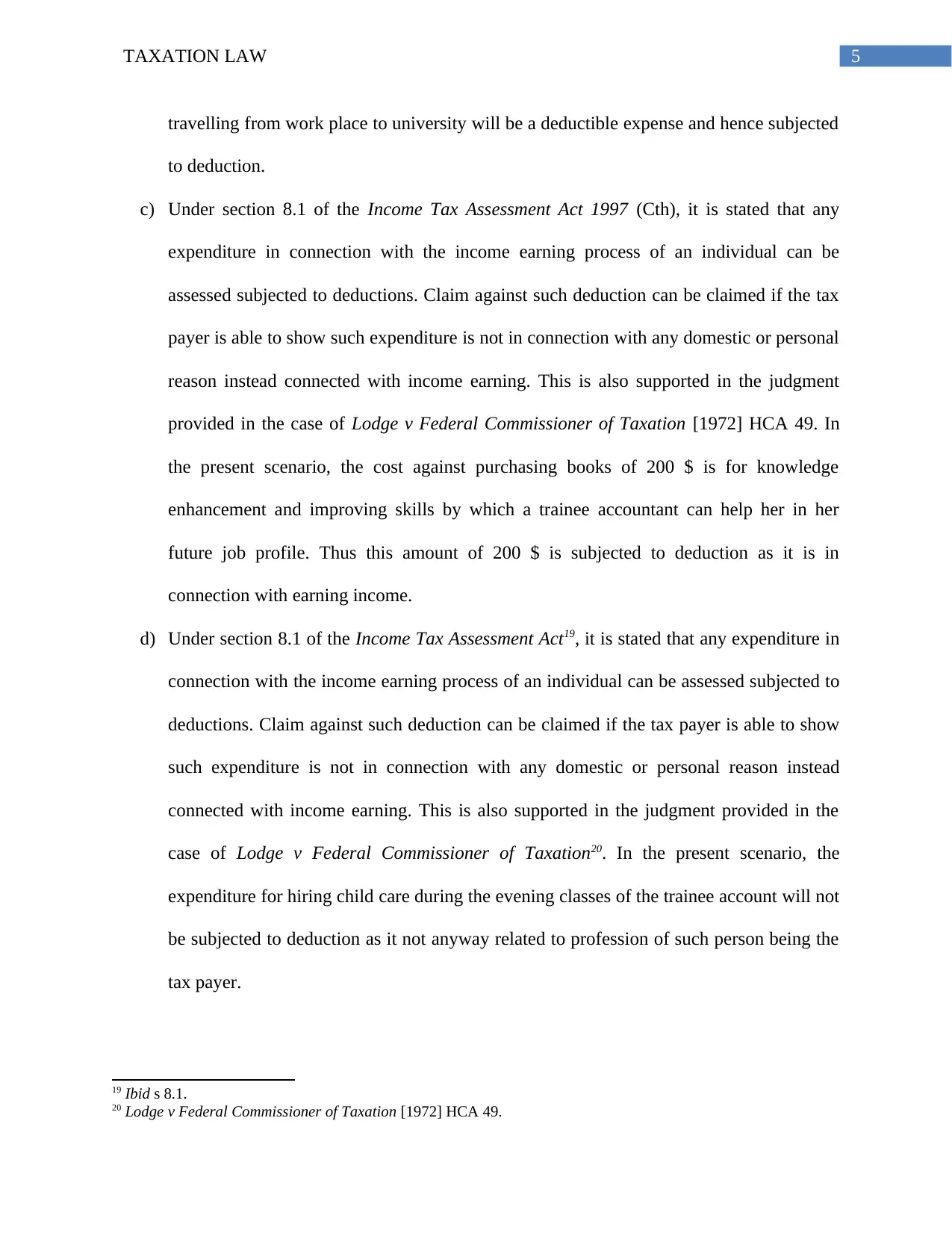
5TAXATION LAW
travelling from work place to university will be a deductible expense and hence subjected
to deduction.
c) Under section 8.1 of the Income Tax Assessment Act 1997 (Cth), it is stated that any
expenditure in connection with the income earning process of an individual can be
assessed subjected to deductions. Claim against such deduction can be claimed if the tax
payer is able to show such expenditure is not in connection with any domestic or personal
reason instead connected with income earning. This is also supported in the judgment
provided in the case of Lodge v Federal Commissioner of Taxation [1972] HCA 49. In
the present scenario, the cost against purchasing books of 200 $ is for knowledge
enhancement and improving skills by which a trainee accountant can help her in her
future job profile. Thus this amount of 200 $ is subjected to deduction as it is in
connection with earning income.
d) Under section 8.1 of the Income Tax Assessment Act19, it is stated that any expenditure in
connection with the income earning process of an individual can be assessed subjected to
deductions. Claim against such deduction can be claimed if the tax payer is able to show
such expenditure is not in connection with any domestic or personal reason instead
connected with income earning. This is also supported in the judgment provided in the
case of Lodge v Federal Commissioner of Taxation20. In the present scenario, the
expenditure for hiring child care during the evening classes of the trainee account will not
be subjected to deduction as it not anyway related to profession of such person being the
tax payer.
19 Ibid s 8.1.
20 Lodge v Federal Commissioner of Taxation [1972] HCA 49.
travelling from work place to university will be a deductible expense and hence subjected
to deduction.
c) Under section 8.1 of the Income Tax Assessment Act 1997 (Cth), it is stated that any
expenditure in connection with the income earning process of an individual can be
assessed subjected to deductions. Claim against such deduction can be claimed if the tax
payer is able to show such expenditure is not in connection with any domestic or personal
reason instead connected with income earning. This is also supported in the judgment
provided in the case of Lodge v Federal Commissioner of Taxation [1972] HCA 49. In
the present scenario, the cost against purchasing books of 200 $ is for knowledge
enhancement and improving skills by which a trainee accountant can help her in her
future job profile. Thus this amount of 200 $ is subjected to deduction as it is in
connection with earning income.
d) Under section 8.1 of the Income Tax Assessment Act19, it is stated that any expenditure in
connection with the income earning process of an individual can be assessed subjected to
deductions. Claim against such deduction can be claimed if the tax payer is able to show
such expenditure is not in connection with any domestic or personal reason instead
connected with income earning. This is also supported in the judgment provided in the
case of Lodge v Federal Commissioner of Taxation20. In the present scenario, the
expenditure for hiring child care during the evening classes of the trainee account will not
be subjected to deduction as it not anyway related to profession of such person being the
tax payer.
19 Ibid s 8.1.
20 Lodge v Federal Commissioner of Taxation [1972] HCA 49.
⊘ This is a preview!⊘
Do you want full access?
Subscribe today to unlock all pages.

Trusted by 1+ million students worldwide
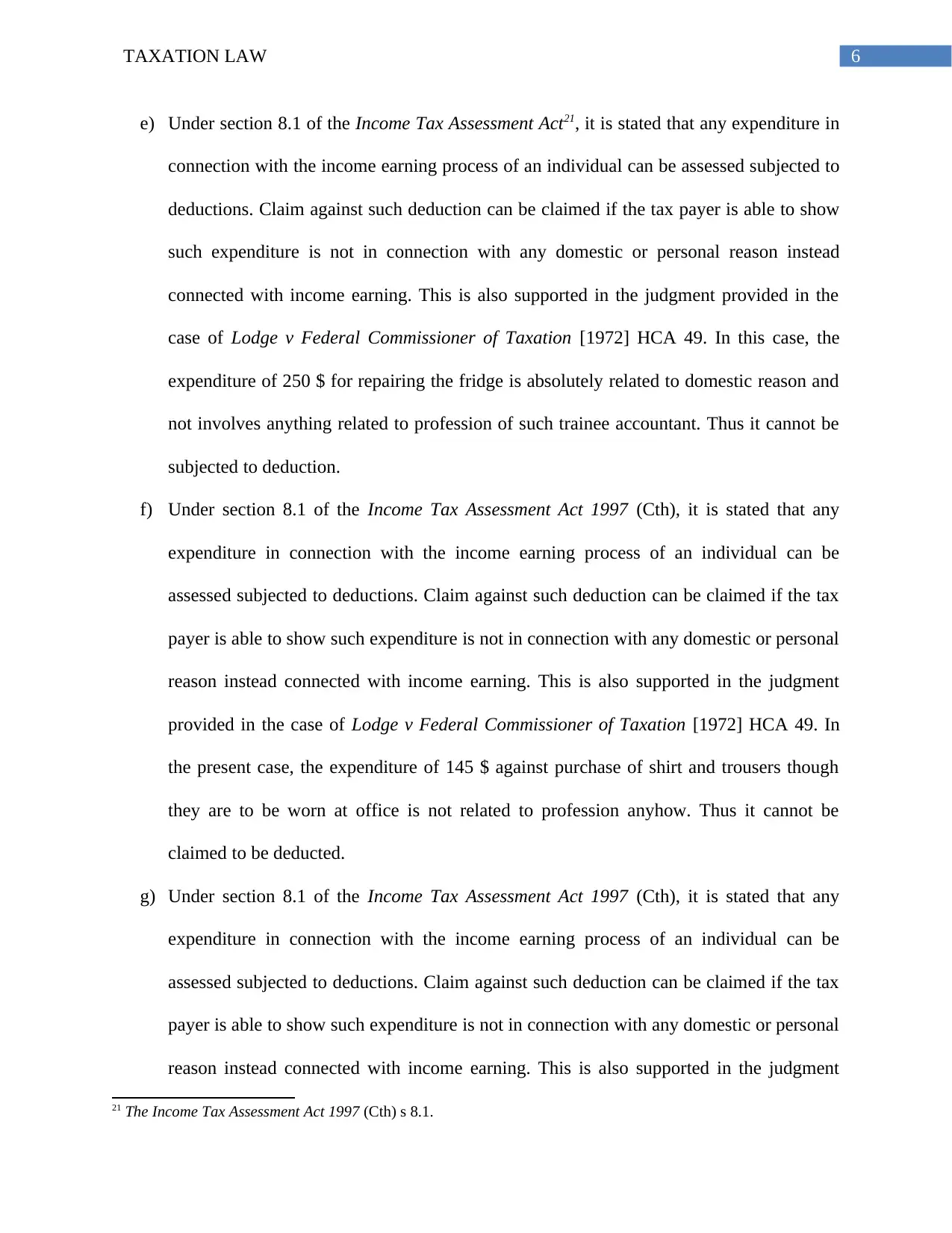
6TAXATION LAW
e) Under section 8.1 of the Income Tax Assessment Act21, it is stated that any expenditure in
connection with the income earning process of an individual can be assessed subjected to
deductions. Claim against such deduction can be claimed if the tax payer is able to show
such expenditure is not in connection with any domestic or personal reason instead
connected with income earning. This is also supported in the judgment provided in the
case of Lodge v Federal Commissioner of Taxation [1972] HCA 49. In this case, the
expenditure of 250 $ for repairing the fridge is absolutely related to domestic reason and
not involves anything related to profession of such trainee accountant. Thus it cannot be
subjected to deduction.
f) Under section 8.1 of the Income Tax Assessment Act 1997 (Cth), it is stated that any
expenditure in connection with the income earning process of an individual can be
assessed subjected to deductions. Claim against such deduction can be claimed if the tax
payer is able to show such expenditure is not in connection with any domestic or personal
reason instead connected with income earning. This is also supported in the judgment
provided in the case of Lodge v Federal Commissioner of Taxation [1972] HCA 49. In
the present case, the expenditure of 145 $ against purchase of shirt and trousers though
they are to be worn at office is not related to profession anyhow. Thus it cannot be
claimed to be deducted.
g) Under section 8.1 of the Income Tax Assessment Act 1997 (Cth), it is stated that any
expenditure in connection with the income earning process of an individual can be
assessed subjected to deductions. Claim against such deduction can be claimed if the tax
payer is able to show such expenditure is not in connection with any domestic or personal
reason instead connected with income earning. This is also supported in the judgment
21 The Income Tax Assessment Act 1997 (Cth) s 8.1.
e) Under section 8.1 of the Income Tax Assessment Act21, it is stated that any expenditure in
connection with the income earning process of an individual can be assessed subjected to
deductions. Claim against such deduction can be claimed if the tax payer is able to show
such expenditure is not in connection with any domestic or personal reason instead
connected with income earning. This is also supported in the judgment provided in the
case of Lodge v Federal Commissioner of Taxation [1972] HCA 49. In this case, the
expenditure of 250 $ for repairing the fridge is absolutely related to domestic reason and
not involves anything related to profession of such trainee accountant. Thus it cannot be
subjected to deduction.
f) Under section 8.1 of the Income Tax Assessment Act 1997 (Cth), it is stated that any
expenditure in connection with the income earning process of an individual can be
assessed subjected to deductions. Claim against such deduction can be claimed if the tax
payer is able to show such expenditure is not in connection with any domestic or personal
reason instead connected with income earning. This is also supported in the judgment
provided in the case of Lodge v Federal Commissioner of Taxation [1972] HCA 49. In
the present case, the expenditure of 145 $ against purchase of shirt and trousers though
they are to be worn at office is not related to profession anyhow. Thus it cannot be
claimed to be deducted.
g) Under section 8.1 of the Income Tax Assessment Act 1997 (Cth), it is stated that any
expenditure in connection with the income earning process of an individual can be
assessed subjected to deductions. Claim against such deduction can be claimed if the tax
payer is able to show such expenditure is not in connection with any domestic or personal
reason instead connected with income earning. This is also supported in the judgment
21 The Income Tax Assessment Act 1997 (Cth) s 8.1.
Paraphrase This Document
Need a fresh take? Get an instant paraphrase of this document with our AI Paraphraser
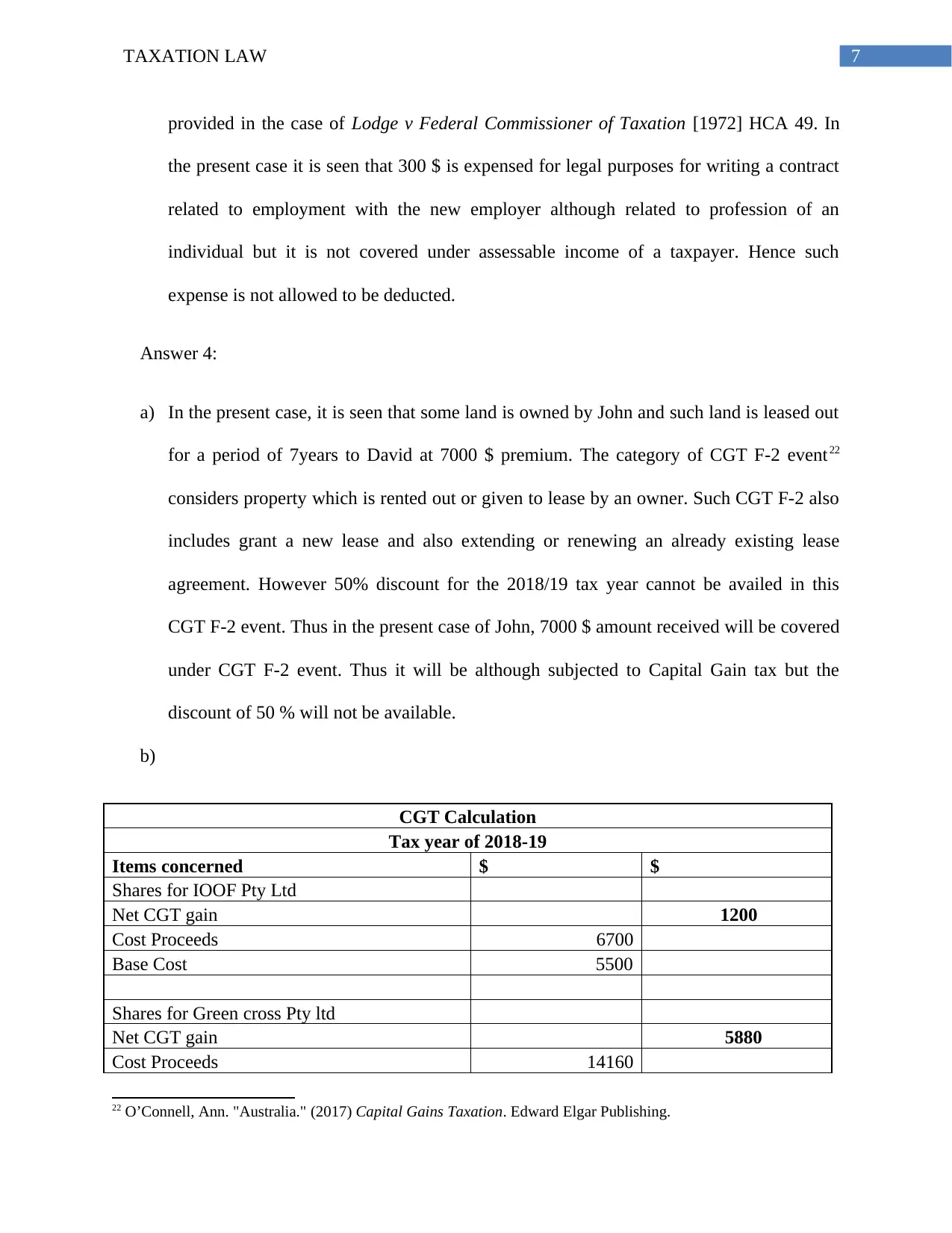
7TAXATION LAW
provided in the case of Lodge v Federal Commissioner of Taxation [1972] HCA 49. In
the present case it is seen that 300 $ is expensed for legal purposes for writing a contract
related to employment with the new employer although related to profession of an
individual but it is not covered under assessable income of a taxpayer. Hence such
expense is not allowed to be deducted.
Answer 4:
a) In the present case, it is seen that some land is owned by John and such land is leased out
for a period of 7years to David at 7000 $ premium. The category of CGT F-2 event22
considers property which is rented out or given to lease by an owner. Such CGT F-2 also
includes grant a new lease and also extending or renewing an already existing lease
agreement. However 50% discount for the 2018/19 tax year cannot be availed in this
CGT F-2 event. Thus in the present case of John, 7000 $ amount received will be covered
under CGT F-2 event. Thus it will be although subjected to Capital Gain tax but the
discount of 50 % will not be available.
b)
CGT Calculation
Tax year of 2018-19
Items concerned $ $
Shares for IOOF Pty Ltd
Net CGT gain 1200
Cost Proceeds 6700
Base Cost 5500
Shares for Green cross Pty ltd
Net CGT gain 5880
Cost Proceeds 14160
22 O’Connell, Ann. "Australia." (2017) Capital Gains Taxation. Edward Elgar Publishing.
provided in the case of Lodge v Federal Commissioner of Taxation [1972] HCA 49. In
the present case it is seen that 300 $ is expensed for legal purposes for writing a contract
related to employment with the new employer although related to profession of an
individual but it is not covered under assessable income of a taxpayer. Hence such
expense is not allowed to be deducted.
Answer 4:
a) In the present case, it is seen that some land is owned by John and such land is leased out
for a period of 7years to David at 7000 $ premium. The category of CGT F-2 event22
considers property which is rented out or given to lease by an owner. Such CGT F-2 also
includes grant a new lease and also extending or renewing an already existing lease
agreement. However 50% discount for the 2018/19 tax year cannot be availed in this
CGT F-2 event. Thus in the present case of John, 7000 $ amount received will be covered
under CGT F-2 event. Thus it will be although subjected to Capital Gain tax but the
discount of 50 % will not be available.
b)
CGT Calculation
Tax year of 2018-19
Items concerned $ $
Shares for IOOF Pty Ltd
Net CGT gain 1200
Cost Proceeds 6700
Base Cost 5500
Shares for Green cross Pty ltd
Net CGT gain 5880
Cost Proceeds 14160
22 O’Connell, Ann. "Australia." (2017) Capital Gains Taxation. Edward Elgar Publishing.
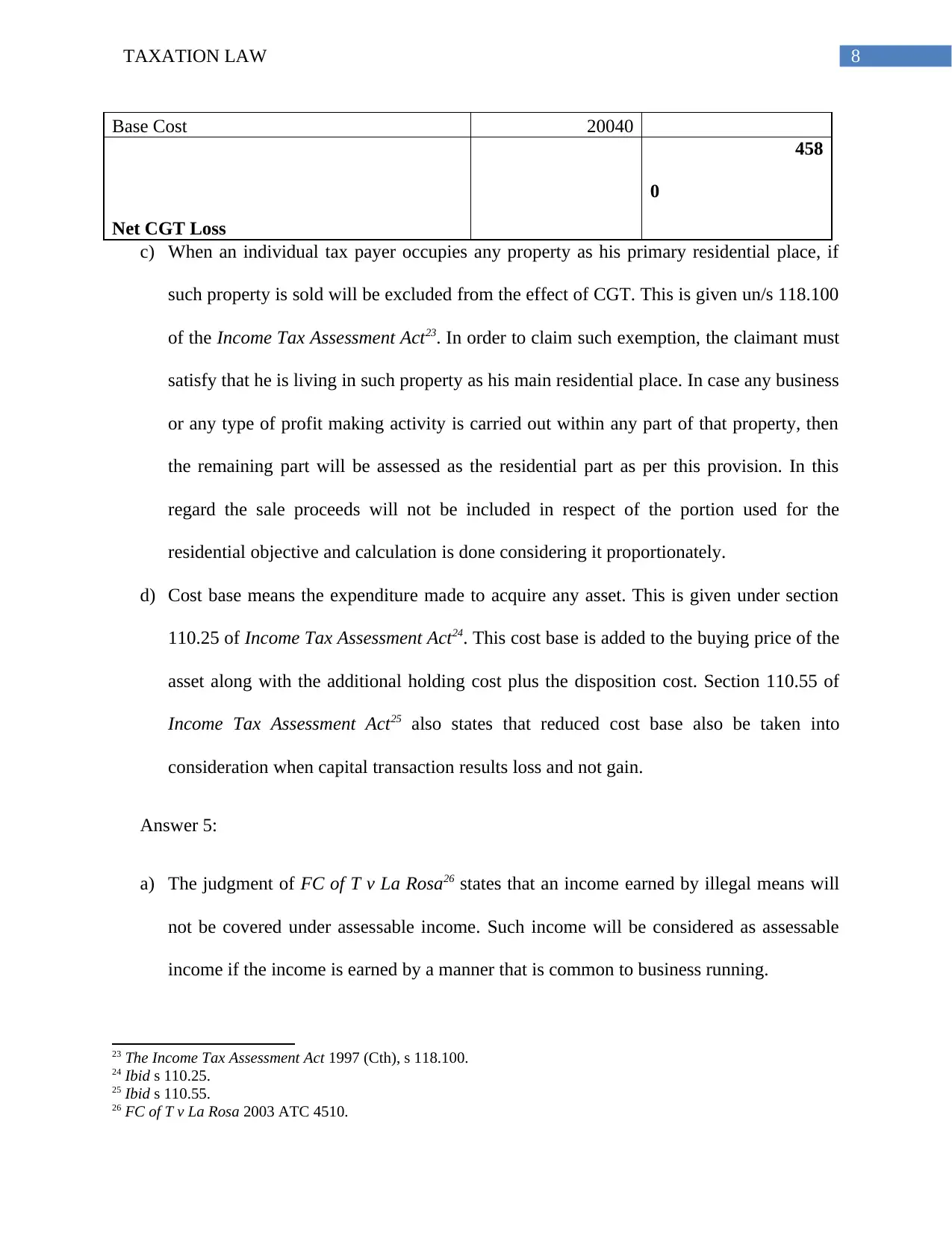
8TAXATION LAW
Base Cost 20040
Net CGT Loss
458
0
c) When an individual tax payer occupies any property as his primary residential place, if
such property is sold will be excluded from the effect of CGT. This is given un/s 118.100
of the Income Tax Assessment Act23. In order to claim such exemption, the claimant must
satisfy that he is living in such property as his main residential place. In case any business
or any type of profit making activity is carried out within any part of that property, then
the remaining part will be assessed as the residential part as per this provision. In this
regard the sale proceeds will not be included in respect of the portion used for the
residential objective and calculation is done considering it proportionately.
d) Cost base means the expenditure made to acquire any asset. This is given under section
110.25 of Income Tax Assessment Act24. This cost base is added to the buying price of the
asset along with the additional holding cost plus the disposition cost. Section 110.55 of
Income Tax Assessment Act25 also states that reduced cost base also be taken into
consideration when capital transaction results loss and not gain.
Answer 5:
a) The judgment of FC of T v La Rosa26 states that an income earned by illegal means will
not be covered under assessable income. Such income will be considered as assessable
income if the income is earned by a manner that is common to business running.
23 The Income Tax Assessment Act 1997 (Cth), s 118.100.
24 Ibid s 110.25.
25 Ibid s 110.55.
26 FC of T v La Rosa 2003 ATC 4510.
Base Cost 20040
Net CGT Loss
458
0
c) When an individual tax payer occupies any property as his primary residential place, if
such property is sold will be excluded from the effect of CGT. This is given un/s 118.100
of the Income Tax Assessment Act23. In order to claim such exemption, the claimant must
satisfy that he is living in such property as his main residential place. In case any business
or any type of profit making activity is carried out within any part of that property, then
the remaining part will be assessed as the residential part as per this provision. In this
regard the sale proceeds will not be included in respect of the portion used for the
residential objective and calculation is done considering it proportionately.
d) Cost base means the expenditure made to acquire any asset. This is given under section
110.25 of Income Tax Assessment Act24. This cost base is added to the buying price of the
asset along with the additional holding cost plus the disposition cost. Section 110.55 of
Income Tax Assessment Act25 also states that reduced cost base also be taken into
consideration when capital transaction results loss and not gain.
Answer 5:
a) The judgment of FC of T v La Rosa26 states that an income earned by illegal means will
not be covered under assessable income. Such income will be considered as assessable
income if the income is earned by a manner that is common to business running.
23 The Income Tax Assessment Act 1997 (Cth), s 118.100.
24 Ibid s 110.25.
25 Ibid s 110.55.
26 FC of T v La Rosa 2003 ATC 4510.
⊘ This is a preview!⊘
Do you want full access?
Subscribe today to unlock all pages.

Trusted by 1+ million students worldwide
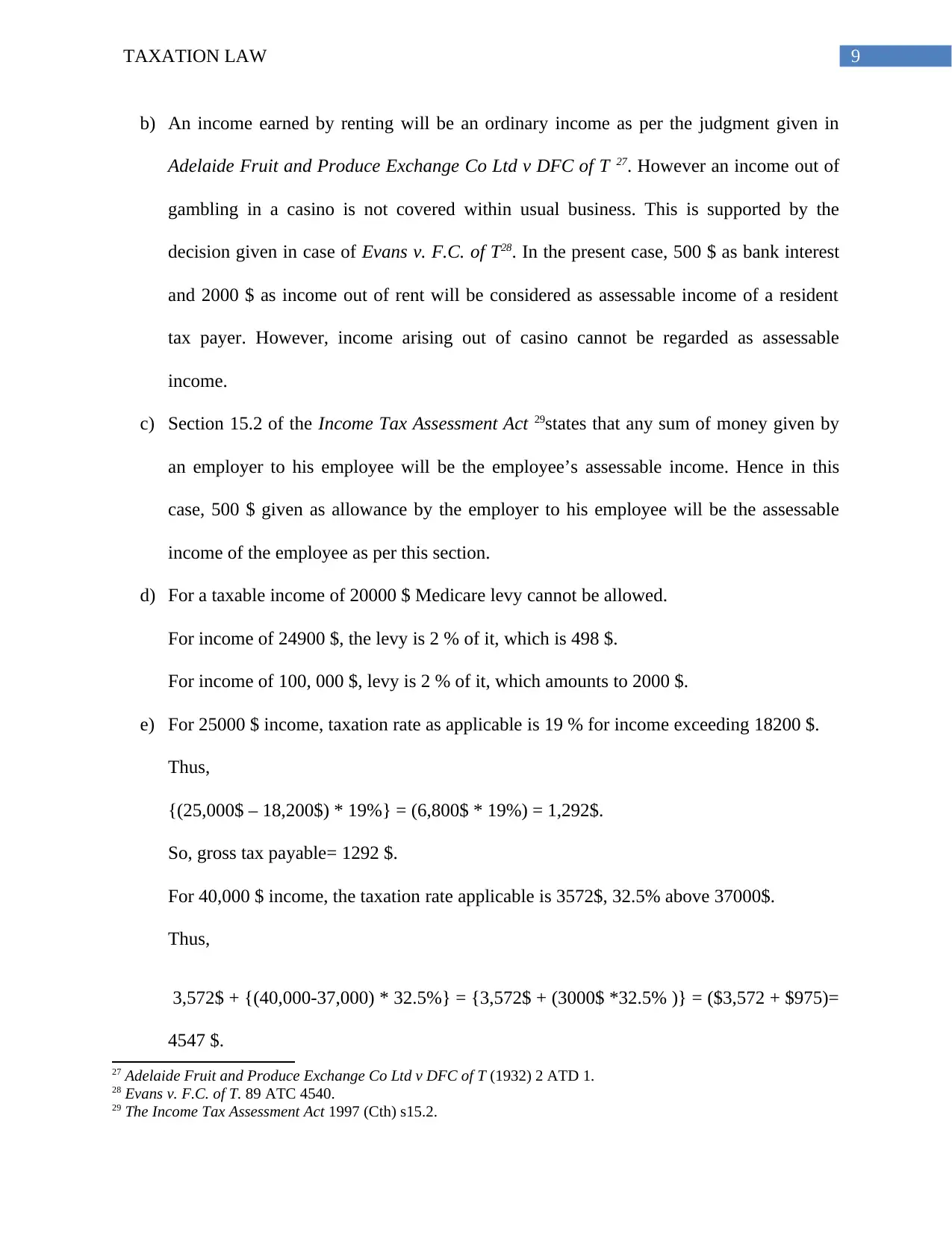
9TAXATION LAW
b) An income earned by renting will be an ordinary income as per the judgment given in
Adelaide Fruit and Produce Exchange Co Ltd v DFC of T 27. However an income out of
gambling in a casino is not covered within usual business. This is supported by the
decision given in case of Evans v. F.C. of T28. In the present case, 500 $ as bank interest
and 2000 $ as income out of rent will be considered as assessable income of a resident
tax payer. However, income arising out of casino cannot be regarded as assessable
income.
c) Section 15.2 of the Income Tax Assessment Act 29states that any sum of money given by
an employer to his employee will be the employee’s assessable income. Hence in this
case, 500 $ given as allowance by the employer to his employee will be the assessable
income of the employee as per this section.
d) For a taxable income of 20000 $ Medicare levy cannot be allowed.
For income of 24900 $, the levy is 2 % of it, which is 498 $.
For income of 100, 000 $, levy is 2 % of it, which amounts to 2000 $.
e) For 25000 $ income, taxation rate as applicable is 19 % for income exceeding 18200 $.
Thus,
{(25,000$ – 18,200$) * 19%} = (6,800$ * 19%) = 1,292$.
So, gross tax payable= 1292 $.
For 40,000 $ income, the taxation rate applicable is 3572$, 32.5% above 37000$.
Thus,
3,572$ + {(40,000-37,000) * 32.5%} = {3,572$ + (3000$ *32.5% )} = ($3,572 + $975)=
4547 $.
27 Adelaide Fruit and Produce Exchange Co Ltd v DFC of T (1932) 2 ATD 1.
28 Evans v. F.C. of T. 89 ATC 4540.
29 The Income Tax Assessment Act 1997 (Cth) s15.2.
b) An income earned by renting will be an ordinary income as per the judgment given in
Adelaide Fruit and Produce Exchange Co Ltd v DFC of T 27. However an income out of
gambling in a casino is not covered within usual business. This is supported by the
decision given in case of Evans v. F.C. of T28. In the present case, 500 $ as bank interest
and 2000 $ as income out of rent will be considered as assessable income of a resident
tax payer. However, income arising out of casino cannot be regarded as assessable
income.
c) Section 15.2 of the Income Tax Assessment Act 29states that any sum of money given by
an employer to his employee will be the employee’s assessable income. Hence in this
case, 500 $ given as allowance by the employer to his employee will be the assessable
income of the employee as per this section.
d) For a taxable income of 20000 $ Medicare levy cannot be allowed.
For income of 24900 $, the levy is 2 % of it, which is 498 $.
For income of 100, 000 $, levy is 2 % of it, which amounts to 2000 $.
e) For 25000 $ income, taxation rate as applicable is 19 % for income exceeding 18200 $.
Thus,
{(25,000$ – 18,200$) * 19%} = (6,800$ * 19%) = 1,292$.
So, gross tax payable= 1292 $.
For 40,000 $ income, the taxation rate applicable is 3572$, 32.5% above 37000$.
Thus,
3,572$ + {(40,000-37,000) * 32.5%} = {3,572$ + (3000$ *32.5% )} = ($3,572 + $975)=
4547 $.
27 Adelaide Fruit and Produce Exchange Co Ltd v DFC of T (1932) 2 ATD 1.
28 Evans v. F.C. of T. 89 ATC 4540.
29 The Income Tax Assessment Act 1997 (Cth) s15.2.
Paraphrase This Document
Need a fresh take? Get an instant paraphrase of this document with our AI Paraphraser
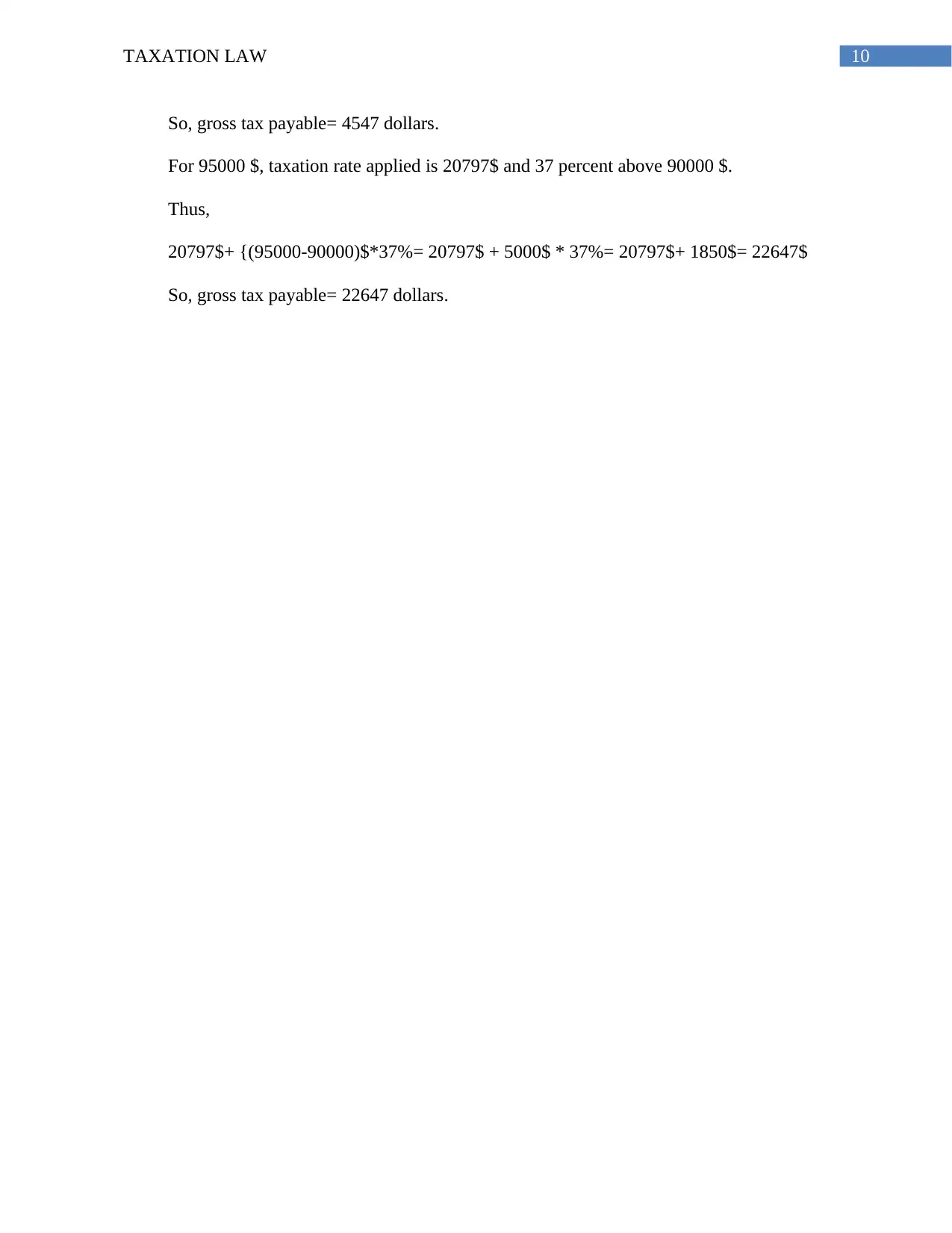
10TAXATION LAW
So, gross tax payable= 4547 dollars.
For 95000 $, taxation rate applied is 20797$ and 37 percent above 90000 $.
Thus,
20797$+ {(95000-90000)$*37%= 20797$ + 5000$ * 37%= 20797$+ 1850$= 22647$
So, gross tax payable= 22647 dollars.
So, gross tax payable= 4547 dollars.
For 95000 $, taxation rate applied is 20797$ and 37 percent above 90000 $.
Thus,
20797$+ {(95000-90000)$*37%= 20797$ + 5000$ * 37%= 20797$+ 1850$= 22647$
So, gross tax payable= 22647 dollars.
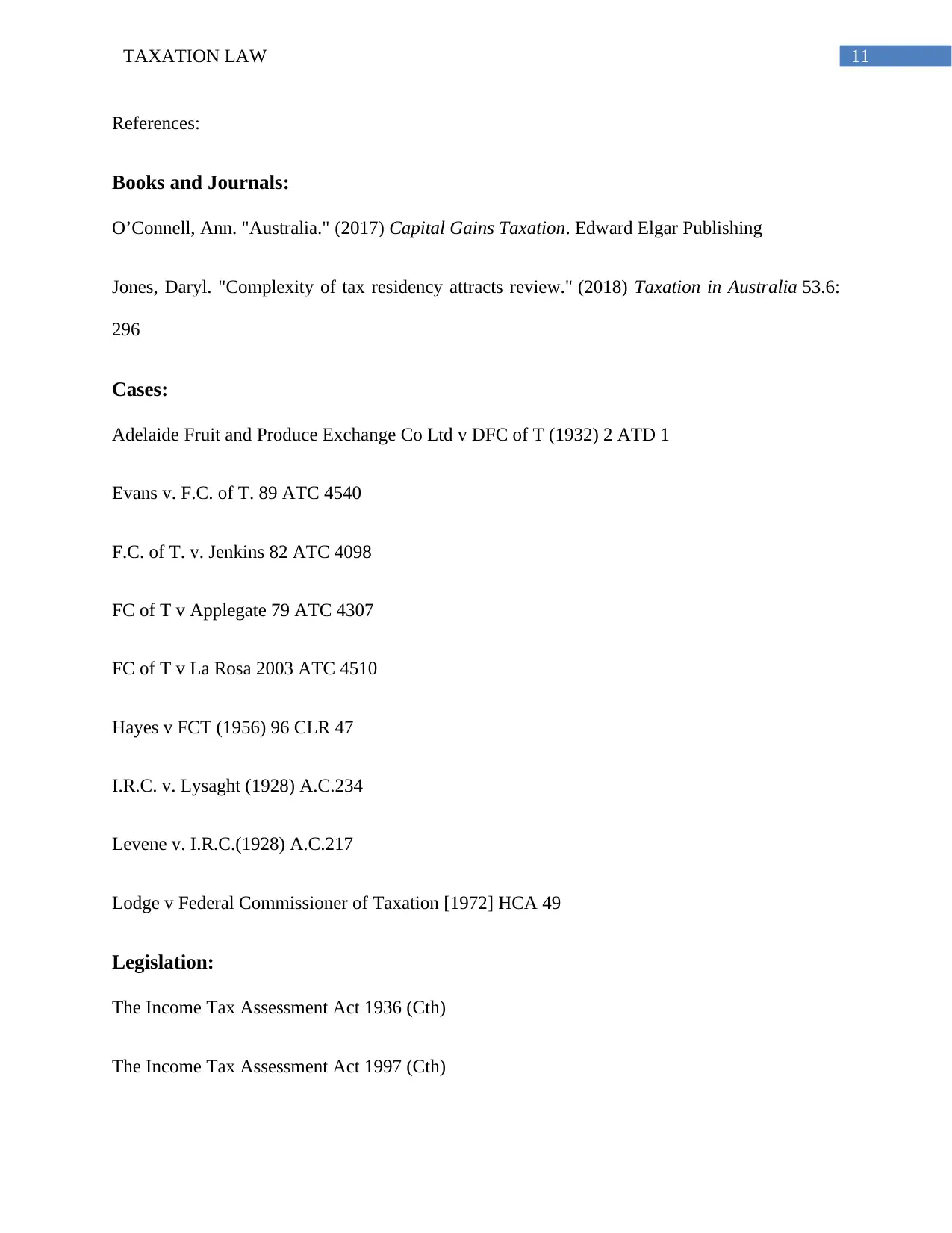
11TAXATION LAW
References:
Books and Journals:
O’Connell, Ann. "Australia." (2017) Capital Gains Taxation. Edward Elgar Publishing
Jones, Daryl. "Complexity of tax residency attracts review." (2018) Taxation in Australia 53.6:
296
Cases:
Adelaide Fruit and Produce Exchange Co Ltd v DFC of T (1932) 2 ATD 1
Evans v. F.C. of T. 89 ATC 4540
F.C. of T. v. Jenkins 82 ATC 4098
FC of T v Applegate 79 ATC 4307
FC of T v La Rosa 2003 ATC 4510
Hayes v FCT (1956) 96 CLR 47
I.R.C. v. Lysaght (1928) A.C.234
Levene v. I.R.C.(1928) A.C.217
Lodge v Federal Commissioner of Taxation [1972] HCA 49
Legislation:
The Income Tax Assessment Act 1936 (Cth)
The Income Tax Assessment Act 1997 (Cth)
References:
Books and Journals:
O’Connell, Ann. "Australia." (2017) Capital Gains Taxation. Edward Elgar Publishing
Jones, Daryl. "Complexity of tax residency attracts review." (2018) Taxation in Australia 53.6:
296
Cases:
Adelaide Fruit and Produce Exchange Co Ltd v DFC of T (1932) 2 ATD 1
Evans v. F.C. of T. 89 ATC 4540
F.C. of T. v. Jenkins 82 ATC 4098
FC of T v Applegate 79 ATC 4307
FC of T v La Rosa 2003 ATC 4510
Hayes v FCT (1956) 96 CLR 47
I.R.C. v. Lysaght (1928) A.C.234
Levene v. I.R.C.(1928) A.C.217
Lodge v Federal Commissioner of Taxation [1972] HCA 49
Legislation:
The Income Tax Assessment Act 1936 (Cth)
The Income Tax Assessment Act 1997 (Cth)
⊘ This is a preview!⊘
Do you want full access?
Subscribe today to unlock all pages.

Trusted by 1+ million students worldwide
1 out of 13
Related Documents
Your All-in-One AI-Powered Toolkit for Academic Success.
+13062052269
info@desklib.com
Available 24*7 on WhatsApp / Email
![[object Object]](/_next/static/media/star-bottom.7253800d.svg)
Unlock your academic potential
Copyright © 2020–2026 A2Z Services. All Rights Reserved. Developed and managed by ZUCOL.





